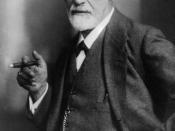Criminal behavior has a multitude of theories attempting to explain its origins ranging form the bizarre to the mundane. These include everything from tattoos causing crime, to crime being caused by poor parenting. There are a large number of theories attempting to explain crime through empirical methods from a multitude of disciplines - sociology, biology, and the area of specificity for this paper - psychology. Psychological methods beginning in Aristotle's Nichomachean ethics all the way through modern personality theories all attempt to explain the internal motivations of crime. These theories warrant a thorough investigation and analysis.
Early criminal theory was a branch of philosophy based on a theistic principle of good and evil natures. The early Greek thinkers felt that crime was caused by improper moral education. They also felt that god inspired the law and only through religious education would people be able to over come the base lack of moral knowledge to maintain the standards of the society in which they lived.
The belief was further held that parental responsibility when not fulfilled caused a person of poor character or criminal nature to be created. The Romans largely followed the Greek model of criminal behavior.
Medieval Theories of crime were based on an inherently catholic society's overly theistic view of society. They felt the cause of crime was poor moral training and spiritual health. The crime was committed was a sin caused by the succumbing to Satan or the possession by a demon. The methods of prevention reflected these beliefs. They felt that by causing everyone to focus on god that they could prevent socially undesirable behaviors. Thusly, the medieval preoccupation with religious activities.
The first foray major foray into psychology based scientific research was by Sigmund Freud. His psychoanalytic theory was the first complete personality theory while...


